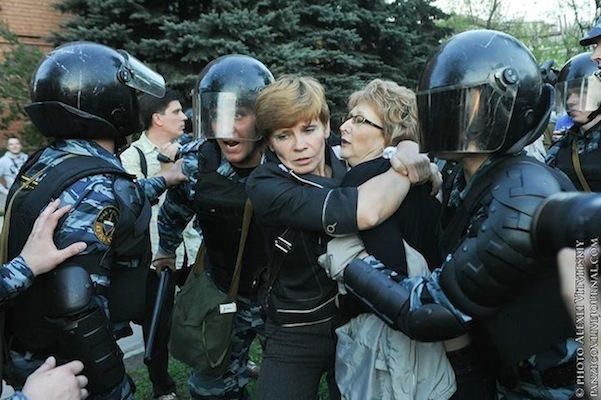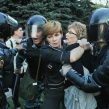
Clan In-fighting Reveals Cast of Secret Support for Moscow Demonstrators
Publication: Eurasia Daily Monitor Volume: 9 Issue: 100
By:

Two days after the protest rally in Moscow on May 6 ended in violence, Vladimir Putin’s press secretary, Dmitry Peskov, told one of the opposition leaders: “The demonstrators’ livers ought to be smeared on the asphalt for every wounded OMON riot policeman” (https://ilya-ponomarev.livejournal.com/482999.html). In Moscow, these words were universally perceived to be the opinion of his boss and a signal that there would soon be a crackdown on the opposition.
But that has not yet happened. Although there are arrests every day and tussles between the police and demonstrators from time to time, there are no signs that the authorities are preparing for mass repressions.
This relatively mild reaction to the protests – compared to Russia’s historical experience of government responses to mass demonstrations – is perhaps the strangest aspect of today’s spirited political scene. No one doubts that Putin has the means to crack down, and few doubt the loyalty of the security ministries, where salaries and benefits have surged under Putin. However, the situation is not as simple as it seems.
In recent rallies, demonstrators have reported that some Interior Ministry OMON (Otriad mobil’ny osobovo naznachenie) riot policemen even refused to carry out orders to make arrests. Significantly, the demonstration on May 6 was not broken up by the Second Rapid Deployment Police Regiment, which is usually given this task, but rather by OMON units brought in from other Russian cities. This is further indirect evidence that the Moscow Interior Ministry troops are not entirely trusted by the authorities. To further illustrate this point, a Livejournal blogger displayed a photo on his site, which depicts a fight that erupted between the Interior Ministry units, apparently over how to deal with the demonstrators (https://avmalgin.livejournal.com/3074052.html).
But there is every indication that the authorities’ uncertain reaction to the demonstrations is a result of conflicts among different groups within the Kremlin. According to Major General Vladimir Ovchinsky, the former head of the Russian Interpol bureau, “The ‘snow revolution’ that began in November and December 2011 was caused by political infighting at the top” (https://svpressa.ru/politic/article/55379). Moreover, Ovchinsky believes that one of the highly-placed people who secretly supports oppositional actions is none other than Natalia Timakova, Dmitry Medvedev’s press secretary. Timakova, he noted, was instrumental in arranging financial support for oppositional events from companies within the Gazprom Media Holding Company. Despite her rather modest job title, Timakova is called “the heart and soul of all the pro-Medvedev forces and the ideologue behind the ex-president’s key statements and proposals” (https://www.og.ru/articles/2012/04/27).
Timakova’s influence on Medvedev comes from her close friendship with former first lady Svetlana Medvedev. Reports in the Russian newspaper Vek indicate that both women were displeased with the deal struck between Medvedev and Putin in the fall of 2011. They wanted Medvedev to run for the presidency, but he refused. At that point, Timakova started on Plan B and reportedly became the author of the “snow revolution” (Wek.ru, March 20).
Even more odd is the number of former KGB officers among the oppositional leadership. Retired KGB Colonel Gennady Gudkov is now a deputy in the lower house of the Russian Parliament for A Just Russia party and takes part in all the important oppositional events with his son Dmitry, also a Duma deputy. In January the online news portal LifeNews published a transcript of secret negotiations between Gudkov and Republican Party leader Vladimir Ryzhkov, in which they discussed practical aspects of organizing rallies in Moscow. According to Gudkov, who is something of a specialist in this area, the talks were taped by the FSB (successor to the KGB) and leaked to the press to compromise him (https://www.mk.ru, January 18).
Following the May events, the conflict between Gudkov and the authorities intensified. Out of the blue on May 13, the police launched a raid on the Oskord Security Company, which belongs to the Gudkov family. The police sealed Oskord’s arms cache, which jeopardized the company’s operations. Gudkov believes that this was done to pressure him, but considering that Oskord employs over 1,000 men trained to handle weapons, the authorities might have had other worries.
Finally, the only Russian newspaper that has reported consistently on oppositional activities is Novaya Gazeta, which belongs to the banker Alexander Lebedev, a retired Lieutenant Colonel in the Foreign Intelligence Service (the other owner is former Soviet president Mikhail Gorbachev). Novaya Gazeta publishes online, real-time reports from the oppositional sit-ins, called “Occupy Moscow,” which is analogous to the “Occupy Wall Street” movement that started in the United States. Lebedev went even further and recently announced that his bank is planning to issue a credit card that would transfer one percent of all transaction amounts to a foundation headed by one of the opposition leaders (https://www.alebedev.ru/media/8624.html)
All of these facts fit together like pieces of a jigsaw puzzle to create a complicated picture of what is occurring behind the scenes of the recent Moscow demonstrations. Various bureaucratic and “siloviki” clans, each controlling their own financial mini-empires, have joined together against the tight Putin clan, which has, in their opinion, consolidated too much political and economic power. They are using the popular protests to their advantage and they are forcing Putin to restrain himself from using force against the demonstrators.
The result of this situation was dramatically described by a headline in the Russian daily newspaper Moskovskii Komsomolets on May 24: “Fear Walks the Corridors of Power.” Today it is impossible to predict the future development of the events, but it is growing clearer that the period of stability, which was once considered Vladimir Putin’s greatest achievement, is now coming to an end.




